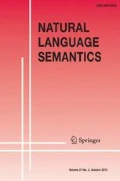Abstract
Breheny et al. (Nat Lang Semant, 2017) argue against the structural approach to alternatives. The empirical force of their argument comes mostly from challenges raised against Trinh and Haida (Nat Lang Semant 23:249–270, 2015). This paper aims to respond to these challenges, showing how they can be met by a natural refinement of Trinh and Haida’s proposal which turns out to capture additional facts previously not accounted for. Another aim of this paper is to recount the debate with enough precision and explicitness in order to enhance understanding and facilitate future discussions.
Similar content being viewed by others
References
Bartsch, Renate, and Theo Vennemann. 1972. Semantic structures. Frankfurt: Athenäum.
Breheny, Richard, Nathan Klinedinst, Jacopo Romoli, and Yasutada Sudo. 2017. The symmetry problem: current theories and prospects. Natural Language Semantics. https://doi.org/10.1007/s11050-017-9141-z.
Carnie, Andrew. 2006. Syntax: A generative introduction. New York: Blackwell Publishing.
Chierchia, Gennaro, Danny Fox, and Benjamin Spector. 2012. The grammatical view of scalar implicatures and the relationship between semantics and pragmatics. In Semantics: An international handbook of natural language meaning, ed. Paul Portner, Claudia Maienborn, and Klaus von Heusinger, 2297–2331. Berlin: De Gruyter.
Chomsky, Noam. 1995. The minimalist program. Cambridge, MA: MIT Press.
Cresswell, Max J. 1976. The semantics of degree. Montague grammar, ed. B.H. Partee, 261–292. New York: Academic Press.
Fox, Danny. 2003. On logical form. In Minimalist syntax, ed. Randall Hendrick, 82–123. New York: Blackwell.
Fox, Danny. 2000. Economy and semantic interpretation. Cambridge, MA: MIT Press.
Fox, Danny. 2007a. Free choice disjunction and the theory of scalar implicatures. In Presupposition and implicature in compositional semantics, ed. Uli Sauerland and Penka Stateva, 71–120. Basingstoke: Palgrave-Macmillan.
Fox, Danny. 2007b. Pragmatics in linguistic theory. MIT classnotes.
Fox, Danny, and Martin Hackl. 2006. The universal density of measurement. Linguistics and Philosophy 29: 537–586.
Fox, Danny, and Roni Katzir. 2011. On the characterization of alternatives. Natural Language Semantics 19: 87–107.
Grice, Paul. 1967. Logic and conversation. William James Lectures. Cambridge, MA: Harvard University.
Groenendijk, Jeroen, and Martin Stokhof. 1984. Studies on the semantics of questions and the pragmatics of answers. Doctoral dissertation, University of Amsterdam.
Hale, Ken, and Samuel Jay Keyser. 1993. On argument structure and the lexical expression of syntactic relations. Cambridge, MA: MIT Press.
Hale, Ken, and Samuel Jay Keyser. 2002. Prolegomenon to a theory of argument structure. Cambridge, MA: MIT Press.
Heim, Irene. 1991. Artikel und Definitheit. In Semantik: Ein internationales Handbuch der zeitgenössischen Forschung, ed. Arnim von Stechow and Dieter Wunderlich, 487–535. Berlin: De Gruyter.
Heim, Irene, and Angelika Kratzer. 1998. Semantics in generative grammar. Oxford: Blackwell.
Horn, Laurence. 1972. On the semantic properties of the logical operators in English. Doctoral dissertation, UCLA.
Horn, Laurence. 1989. A natural history of negation. Chicago: University of Chicago Press.
Katzir, Roni. 2007. Structurally-defined alternatives. Linguistics and Philosophy 30: 669–690.
Katzir, Roni, and Raj Singh. 2013. Constraints on the lexicalization of logical operators. Linguistics and Philosophy 36: 1–29.
Klein, Ewan. 1980. A semantics for positive and comparative adjectives. Linguistics and Philosophy 4: 1–45. https://doi.org/10.1007/BF00351812.
Kratzer, Angelika. 1996. Severing the external argument from its verb. In Phrase structure and the lexicon, ed. Johan Rooryck and Laurie Zaring, 109–137. Dordrecht: Kluwer Academic Publishers.
Krifka, Manfred. 1995. The semantics and pragmatics of polarity items. Linguistic Analysis 25: 209–257.
Kroch, Anthony. 1972. Lexical and inferred meanings for some time adverbials. Quarterly Progress Reports of the Research Laboratory of Electronics 104: 260–267. Cambridge, MA: MIT.
Lewis, David. 1988. Relevant implication. Theoria 54: 161–174.
Matsumoto, Yo. 1995. The conversational condition on Horn scales. Linguistics and Philosophy 18: 21–60.
Radford, Andrew. 2004. Minimalist syntax: exploring the structure of English. Cambridge: Cambridge University Press.
Romoli, Jacopo. 2013. A problem for the structural characterization of alternatives. Snippets 27: 14–15.
Sauerland, Uli. 2004. Scalar implicatures in complex sentences. Linguistics and Philosophy 27: 367–391.
Spector, Benjamin. 2007. Scalar implicatures: exhaustivity and Gricean reasoning. In Questions in dynamic semantics, ed. M. Aloni, A. Butler, and P. Dekker, 225–250. Amsterdam: Elsevier.
Swanson, Eric. 2010. Structurally definied alternatives and lexicalizations of XOR. Linguistics and Philosophy 33: 31–36.
Trinh, Tue, and Andreas Haida. 2015. Constraining the derivation of alternatives. Natural Language Semantics 23: 249–270.
von Fintel, Kai, and Danny Fox. 2002. Pragmatics in linguistic theory. MIT classnotes.
von Fintel, Kai, and Irene Heim. 1997. Pragmatics in linguistic theory. MIT classnotes.
von Stechow, Arnim. 1984. Comparing semantic theories of comparison. Journal of Semantics 3: 1–77.
Wheeler, Samuel C. 1972. Attributives and their modifiers. Noûs 6: 310–334.
Wurmbrand, Susi. 1998. Restructuring control. University of Pennsylvania Working Papers in Linguistics 5.1.
Wurmbrand, Susi. 2006. Licensing case. Journal of Germanic Linguistics 18: 175–236.
Acknowledgements
I thank Luka Crnič, Danny Fox, Andreas Haida, the audience at ZAS Berlin, and the audience at the Logic, Language and Cognition Center of the Hebrew University of Jerusalem for helpful discussion.
Author information
Authors and Affiliations
Corresponding author
Rights and permissions
About this article
Cite this article
Trinh, T. Keeping it simple. Nat Lang Semantics 26, 111–124 (2018). https://doi.org/10.1007/s11050-018-9143-5
Published:
Issue Date:
DOI: https://doi.org/10.1007/s11050-018-9143-5



